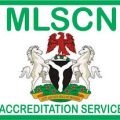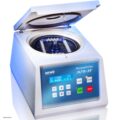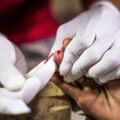Medical laboratory scientists (MLS), also known as clinical laboratory scientists, play a crucial role in the diagnosis, treatment, and management of patients. They are the third-largest medical profession (after doctors & nurses). Medical laboratory scientists perform complex testing using sophisticated instruments to detect diseases and monitor treatment. Medical laboratory science provides clues that are key in the diagnosis and treatment of disease or injury, and laboratory professionals are the detectives of the health care world.
Medical laboratory scientists might isolate and identify an infectious organism that is causing a patient’s pneumonia or cross-match blood to be used in a transfusion. The laboratory testing they perform will show whether a diabetic patient’s glucose is normal or too high or they may perform testing on blood to detect and identify leukemia (cancer of blood cells). They interpret and analyze test results and then communicate the results to physicians or other healthcare providers for patient care. Approximately 70% of medical decisions, diagnoses, treatment, and evaluations, are based on the interpretations of laboratory test results.
In Nigeria, Medical laboratory science is regulated by the Medical Laboratory Science Council of Nigeria (MLSCN) a Federal Government Statutory Regulatory Agency established by Act 11 of 2003 as a parastatal of the Federal Ministry of Health. It also broadly charged the Council with the core responsibilities of regulating medical laboratory services through registration and licensing of medical laboratories as well as practitioners, mandatory inspection, mentoring for quality improvement, accreditation, monitoring, and evaluation as well as certification of laboratory test kits and reagents. Furthermore, the Act empowers the Council to regulate the training of medical laboratory scientists, technicians, and assistants.
Career in Medical laboratory science
Earning a degree in clinical laboratory science opens doors to a wide variety of career opportunities. The majority of graduates sit for the national certification examination that grants the credentials of a medical laboratory scientist, or MLS. Formerly known as a clinical laboratory scientist or medical technologist, the MLS is a “disease detective,” helping to pinpoint the cause of disease through the examination and analysis of blood, tissue, and other body fluids. Specialty areas of laboratory science include clinical chemistry, hematology, transfusion services, clinical immunology, clinical microbiology, and the emerging field of molecular diagnostics.
The field of laboratory testing has evolved. With the appearance of sophisticated automated analytical instruments, laboratory scientists find themselves in the role of making decisions about the validity of data to be used by physicians in medical decisions. This type of analysis requires extensive knowledge of normal and abnormal physiology, correlation of laboratory data to a specific disease as well as extensive knowledge of instrumentation and individual test principles.
A degree in laboratory science can lead to exciting career opportunities. The opportunities are virtually unlimited in hospital laboratories, clinics, forensic laboratories, veterinary clinics, and in medical, biotechnology, and industrial research laboratories. Other areas include cytogenetics, cytotechnology, and histology. With advanced education, you may also find rewarding careers in medicine, teaching, and management.
Medical laboratory science salary in Nigeria.
The salary of a medical laboratory scientist is dependent on several factors which include, education, type of agency or government organization where he or she works, and the level of experience. A mid-career Medical Laboratory Scientist with 5-9 years of experience earns an average total compensation of ₦720,000 based on 9 salaries. An experienced Medical Laboratory Scientist with 10-19 years of experience earns an average total compensation of ₦150,000 based on 5 salaries.
List of universities that offers medical laboratory science in Nigeria
Medical Laboratory Science in Nigeria is taught under five disciplines: Clinical Chemistry, Hematology, Medical Microbiology, Histopathology, and Immunology including Instrumentation and Pharmacology. You will learn how to use sophisticated medical equipment to analyze biological fluids, blood, urine, cerebral-spinal fluid, secretions, excretions, or tissue samples for bacterial infection, hormone levels, and other chemical components affecting human health. Below is a comprehensive list of higher institutions in Nigeria that offers Medical Laboratory Science:
- Ambrose Alli University, Ekpoma
- Afe Babalola University, Ado-Ekiti – Ekiti State
- Abia State University, Uturu
- Achievers University, Owo
- Babcock University, Ilishan-Remo
- Bayero University, Kano
- University of Benin (UNIBEN)
- University of Calabar (UNICAL)
- Ebonyi State University, Abakaliki
- University of Ibadan (UI)
- Igbinedion University Okada
- University of Jos (UNIJOS)
- University of Lagos (UNILAG)
- Ladoke Akintola University of Technology, Ogbomoso (LAUTECH)
- Madonna University, Okija
- University of Maiduguri (UNIMAID)
- Niger Delta University Yenagoa (NDU)
- River State University of Science and Technology (RSUST)
- Usumanu Danfodiyo University (UDUSOK)
- Nnamdi Azikiwe University, Awka (UNIZIK)
- University of Nigeria, Nsukka (UNN)
How Profitable is Medical Laboratory in Nigeria?
In Nigeria, owning a laboratory undoubtedly means owning a good investment. Although, it is usually required that a medical laboratory is coordinated by a Medical Laboratory Technologist/Scientist i.e have obtained a certificate in either of MLT, MLS, BMLS, DMLS etcetera, and must have indexing of the profession’s council.
This qualification is actually a required working criterion for any laboratory to be considered medical. This is not only for medical duties but also for administrative and legal substantiality as the medics are a field of ethical value.
Requirements to Start a Medical Laboratory in Nigeria
Acquire the laboratory Building
The building required must be spacious, ventilated, and lightning and with workbenches. These requirements are to be gotten as part of the laboratory. It is never a crime to use a rented building or a residential apartment. It is, however, noteworthy that there should be less disturbance in such an environment, the laboratory should not be related on a frequent basis and the non-expert should be kept away from the laboratory and working benches at all times.
Purchase Laboratory Equipment
A very important component of any laboratory to be considered in Nigeria is the microscope. The microscope is not just a tool of Nigeria laboratory but a symbol of Medical Laboratory Science which is seen all and everywhere. Categorically, all laboratories in Nigeria have a microscope in the least. Although, there are varieties of two major types, whichever one is gotten shall be okay for an average Nigerian laboratory. The transparent glasses are the most common identity of a laboratory (after the microscope). Examples of glassware to be gotten to a Nigerian laboratory includes Conical & Erlenmeyer flasks, beakers, Bottles, Funnels, Cylinders, Tubes, Pipettes etcetera. These materials are relevant to any laboratory, no matter how lowly, degraded or under-privileged. In the absence of the glasswares, there isn’t a laboratory not to talk of medical tests.
Hence, no laboratory should be found in Nigeria except it has them. These materials could either be graduated or non-graduated, but preferably the graduated ones are okay as they shall be further used to measure quantities.
It is also beneficial to say that bottles to equip to a laboratory is expected to vary from Specimen bottles through reagent bottles to drop bottles. More numbers of specimen than reagent bottles can be provided compared to drop bottles. This worth explaining that pipettes differ; volumetric, graduated, blood, and Pasteur pipette. All of which should be gotten in appropriate proportion. A host of further details will require professional knowledge.
Having secured the above accordingly, another device needed in the medical laboratory is the Centrifuge. A centrifuge is a machine that works on the principle of spinning to sediment rapid particles such as cells. It is used in the determination of PCV (packed cell volume) which is a prominent laboratory test, and other regularly occurring laboratory tests. With respect to this, it is an important one in your laboratory too.
Although, we have the hand centrifuge, which is more antique and give slower speed, and the motor-driven one is recommended. We also have the Micro-hematocrit centrifuge which is also motor-driven and serve a special duty of auto-estimating the PCV of the red blood cell column, usually in percentage as desired. Getting a centrifuge is one of the good steps to take in setting up a medical laboratory.
Weighing scales, also analytical balance, come here on the list of necessities to get in starting a medical laboratory. Despite that weighing scale and analytical balance seems the same, yet they differ in their functions as one measures large quantities while the other weighs smaller quantities.
For the hinge-free running of any laboratory, weighing scales are demanded. Hence, list it among the things to order for building up your laboratory. It is easy for anybody to measure with anything and can even estimate things to the perfect value, however smaller quantities of the measure require the analytical balance. Getting the right peg for the right hole is the quality of being professional.
Although, a laboratory differs considering the branches which it specifies but only a few laboratories in Nigeria are specific and relative to certain fields of clinical sciences like cytology, parasitology, blood banking, histopathology, microbiology, and so on.
However, in all specialization, the Nigeria laboratories must be set up basically with these tools and then especially with specialized equipment which is often expensive and are not easily found in the near vicinity.
All premises for the practice of Medical Laboratory Science must operate with the knowledge and backing of the Council and be fully registered with the Council for such purpose. Medical Laboratories whether Government-owned or private shall be headed by a Medical Laboratory Scientist with cognate experience.
A copy of the current license to practice shall be displayed in a conspicuous area in the business premises (Medical Laboratory) Besides the Council’s seal, a neon or perspex sign embossed with the Council logo would be conspicuously displayed in front of all registered facilities. It is also mandatory that all practitioners abide by the code of conduct which is made available to them on registration.






